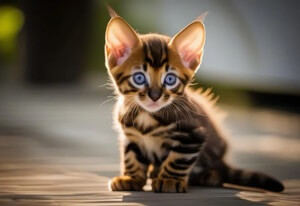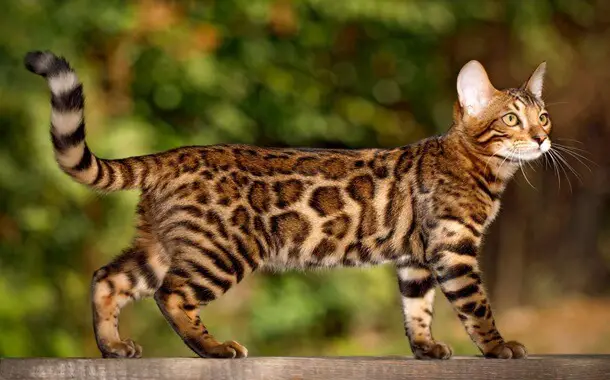How Much Do Bengal Cats Cost?
Last Updated on April 15, 2024
Written by CPA Alec Pow | Content Reviewed by ![]() CFA Alexander Popinker
CFA Alexander Popinker
With their exotic coat markings resembling wild leopards and energetic, athletic personalities, Bengal cats have skyrocketed in popularity as a hybrid breed in recent years. But purchasing one of these striking kittens from a reputable breeder can cost anywhere from $1,000 to $5,000 or more.
This comprehensive guide covers the many factors that influence Bengal kitten pricing, additional ownership costs beyond the initial purchase price, important economic considerations for interested buyers, and whether investing in a Bengal makes sense as a pet after weighing all expenses.
Gaining a full understanding of the short and long-term financial commitments helps ensure prospective owners can be prepared to provide the enriching care this unique breed needs to thrive.
How Much Do Bengal Cats Cost?
On average, prospective Bengal cat owners can expect to pay:
- $1,000 to $3,000 for a basic pet-quality kitten. Lower generation hybrids with more domestic cat genetics tend to be the most affordable.
- $3,000 to $5,000 for a show or breed quality kitten exhibiting exemplary Bengal confirmation closer to wild ancestors. Often higher filial generations.
- $5,000+ for rare breeder quality Bengals with exceptionally vivid and contrasting coat markings paired with champion pedigrees.
Cat Breeds List mentions that Bengal cats are expensive due to their rarity, with prices ranging from $4,000 to $10,000 when buying from a reputable breeder.
Spot Pet Insurance highlights that breeders typically charge between $1,500 to $3,000 for Bengal kittens, ensuring the assurance of a purebred Bengal cat.
Catster emphasizes the rarity of Bengal cats, making them quite expensive and suggesting that potential owners should be prepared to invest a few thousand dollars in acquiring this unique breed.
Hepper provides a comprehensive price guide for Bengal cats, stating that the cost can range from $1,500 to $3,000, with show-quality Bengals commanding higher prices.
Additionally, The Bengal Cats website offers pedigree Bengal cats starting at $2,000, with retired Bengals also available for adoption, emphasizing their breeding from top-quality pedigree Bengal cats.
These sources collectively underscore the premium pricing associated with Bengal cats, reflecting their rarity, unique characteristics, and the costs involved in breeding and caring for these distinctive felines.
Many factors like generation, conformity to the exact breed standard, the strength of pedigree, the reputation of breeder, and geographic region of the cattery impact pricing significantly. We’ll explore those next.
Factors Influencing the Cost of Bengal Kittens
Several variables affect the price point for a Bengal kitten:
- Filial generation – Bengals are classified as F1 to F4 based on how many generations removed they are from the original Asian leopard cat ancestor. F1-F2 kittens with more wild genetics are most scarce and expensive.
- Conformation to breed standard – How closely the kitten’s physical characteristics and temperament match the ideal representation of a Bengal as defined by associations like TICA directly impacts value. Show-quality commands a premium.
- Strength of pedigree – Proven champion pedigrees with award-winning parentage linked to the kitten warrant substantially higher pricing and prestige.
- Reputation of breeder – Experienced breeders with generations of satisfied customers able to vouch for their ethical, humane practices and integrity can charge higher pricing.
- Official registration – TICA registration paperwork proving pedigree lineage adds legitimacy and value for Bengal buyers.
- Geographic region – Urban breeders in cities along the coasts tend to charge the highest rates due to elevated business costs. Rural catteries are often more affordable.
When assessing breeder Bengal kitten pricing, scrutinize health testing rigor, humane practices, kitten conditions, and contracts just as heavily as pedigrees and exotic allure. Reputable catteries invest greatly in their cats.
You might also like our articles about the cost of a Cheetoh cat, Abyssinian cat, or Siamese cat.
Additional Ownership Expenses
Besides the steep upfront investment to acquire a Bengal kitten, responsible ownership also involves considerable added expenses for:
- Veterinary costs – At least $300 per year for routine wellness exams, core vaccinations, parasite prevention and testing. Plus any emergencies or medication.
- Premium diet – No less than $150 annually for the high-protein, grain-free diets Bengals need to thrive. Wet and raw food is ideal.
- Enriching supplies – Around $200 per year minimum for a good rotation of interactive toys to engage their active minds, tall cat trees and perches to climb, treat puzzles to solve, catios for outdoor access, leashes, and other feline gear. Litters, beds, and other basics add on.
- Grooming – Approximately $200+ for annual brushes, nail trims, sanitary shaves, and bathing supplies if not completing them yourself. Long-haired Bengals need more.
Budget at least $1,000+ per year for just the base medical, dietary, enrichment, and grooming needs of a Bengal beyond the original purchase cost. Their exotic breed status means more health issues can arise, raising costs quickly. Sizable emergency funds are a must.
Economic Considerations
 For those tempted by their beauty and energy, some essential factors to weigh before committing financially to a Bengal:
For those tempted by their beauty and energy, some essential factors to weigh before committing financially to a Bengal:
- Is the purchase price realistically aligned with your budget, even for a basic pet-quality kitten from health-tested parents? Bengal cats are priced well above average domestic cats from the outset.
- Can you financially accommodate veterinary bills and emergencies that may cost more than a mixed breed due to exotic hybrid health risks? Medical insurance is wise.
- Does your lifestyle permit the substantial time investment Bengals need through interactive play, training, and supervision daily? An ignored Bengal can become destructive or aggressive.
- Are you equipped to handle potential behavioral challenges with patience and training instead of re-homing? Their intelligence demands engagement.
- Will you fully “Bengal-proof” your home and valuables? Their athletic ability and punkish curiosity demand preventative measures to avoid damage.
While a steep investment, responsible Bengal ownership provides years of delight and close companionship for folks able to fully commit to the financial, practical, and emotional responsibilities. Ensure you’re in a position to succeed before bringing one of these exotic beauties home.
Final Words
With their wildcat aesthetics and animated personalities, Bengal cats offer a truly unique pet ownership experience. However, their rarity means substantial costs, with Bengal kitten purchase pricing averaging $1,000 to $5,000 and care/medical expenses of $1,000+ annually.
Do your homework to find an ethical, experienced breeder and budget ample time and finances to fulfill this breed’s enriched needs. For the properly prepared, a Bengal can become a beloved, rewarding pet for life.
Frequently Asked Questions
Do Bengal cats make good pets?
Bengal cats can make wonderful, rewarding pets for owners who:
- Provide frequent interactive playtime and stimulation to meet their high energy needs.
- Have time to devote to training and preventing behavioral issues.
- Are experienced handling independent, intelligent cats and their antics.
- Are comfortable with vocal cats that frequently chirp and chatter.
If properly trained, socialized, and cared for, Bengals form strong bonds with their owners and can adapt well to indoor home environments. But first-time cat owners may find exotic hybrids like Bengals overwhelming. Do your homework before committing.
Can a Bengal be an indoor cat?
While challenging due to their high activity needs, Bengals can live very full, healthy lives as indoor-only cats provided their environment is properly enriched with:
- Tall multi-level cat trees and shelves offering climbing and perching opportunities.
- Daily active play sessions with interactive wand toys to engage their natural prey drive instincts.
- Food puzzle feeders and treat balls to challenge their intelligence.
- A stimulating ever-changing rotation of toys to beat boredom.
- Catios or leash walks for safe outdoor access.
With dedication to meeting their needs via exercise, mental stimulation, and environmental enhancements, Bengals can thrive indoors. But it requires far more owner commitment than the average cat.
What are the cons of owning a Bengal cat?
Potential drawbacks of owning a Bengal cat include:
- High purchase price – $1,000+ even for basic pet quality Bengals from ethical breeders.
- Demands on your time – Requires substantial interactive playtime and stimulation daily. Left alone, they can be destructive.
- Vocal nature – Frequent chattering and meows. Not suited for quiet households.
- Activity level – Their extreme energy and athleticism demands intensive engagement.
- Potential aggression – Improper socialization may lead to biting, scratching, or rough play.
While rewarding pets for the right owners, Bengals have some challenges. Ensure your lifestyle can provide the enriched environment they thrive in.


Leave a Reply
Want to join the discussion?Feel free to contribute!